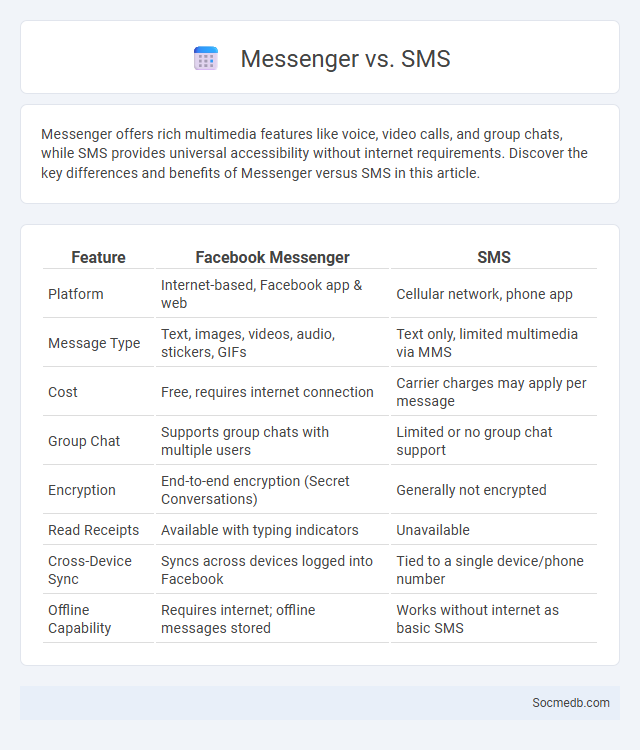
Photo illustration: Messenger vs SMS
Messenger offers rich multimedia features like voice, video calls, and group chats, while SMS provides universal accessibility without internet requirements. Discover the key differences and benefits of Messenger versus SMS in this article.
Table of Comparison
| Feature | Facebook Messenger | SMS |
|---|---|---|
| Platform | Internet-based, Facebook app & web | Cellular network, phone app |
| Message Type | Text, images, videos, audio, stickers, GIFs | Text only, limited multimedia via MMS |
| Cost | Free, requires internet connection | Carrier charges may apply per message |
| Group Chat | Supports group chats with multiple users | Limited or no group chat support |
| Encryption | End-to-end encryption (Secret Conversations) | Generally not encrypted |
| Read Receipts | Available with typing indicators | Unavailable |
| Cross-Device Sync | Syncs across devices logged into Facebook | Tied to a single device/phone number |
| Offline Capability | Requires internet; offline messages stored | Works without internet as basic SMS |
Overview: Messenger vs SMS vs Messaging Apps
Messenger apps like Facebook Messenger offer rich multimedia features, read receipts, and integration with social networks, making them more interactive than traditional SMS. SMS remains widely used for its universal compatibility and reliability across all mobile devices without requiring internet access. Messaging apps such as WhatsApp and Telegram provide encrypted messaging, group chats, and cross-platform support, appealing to users prioritizing privacy and advanced communication tools.
Key Differences Between Messenger, SMS, and Messaging Platforms
Messenger apps like WhatsApp and Facebook Messenger use internet data to send multimedia messages, enabling group chats and read receipts, while SMS relies on cellular networks for basic text messaging without internet dependency. Messaging platforms often offer integrated features like video calls, file sharing, and encryption, providing a more versatile and secure communication experience compared to traditional SMS. Your choice depends on connectivity, privacy needs, and the type of interaction you prefer for seamless communication.
User Experience: Interface and Accessibility
Social media platforms prioritize user experience by designing intuitive interfaces that simplify navigation and enhance engagement. Accessibility features such as voice commands, screen readers, and customizable display settings ensure that Your interactions remain seamless regardless of disabilities. Optimized usability attracts diverse users and fosters inclusive digital communities.
Features Comparison: Chat Functions and Multimedia Support
Social media platforms vary significantly in chat functions and multimedia support, with options like Facebook Messenger offering rich text, voice, and video chat capabilities alongside extensive file sharing. Instagram emphasizes visual content through photo and video messaging, while WhatsApp provides end-to-end encrypted messaging combined with multimedia sharing such as photos, videos, and voice notes. Your choice should consider these features' compatibility with your communication style and multimedia needs.
Cost Implications: Free vs Paid Messaging
Free messaging on social media platforms offers basic communication features without direct costs, but it may include limitations like ads or restricted reach. Paid messaging options enable businesses to target audiences precisely, increase message visibility, and access advanced analytics, often leading to higher engagement rates. Understanding the cost implications helps you balance budget constraints with marketing objectives for optimal campaign performance.
Security and Privacy Considerations
Protecting your personal information on social media platforms requires strong privacy settings and regular updates to account security features such as two-factor authentication. Be cautious about the data you share, including location tags and personal identifiers, to minimize risks of identity theft and data breaches. Monitoring app permissions and avoiding suspicious links can further safeguard your privacy and security online.
Internet Dependency: Online vs Offline Messaging
Internet dependency significantly influences communication patterns, with online messaging dominating over traditional offline methods due to its immediacy and accessibility. Social media platforms like WhatsApp, Facebook Messenger, and Instagram provide real-time interaction, reshaping how individuals maintain relationships and exchange information. Research from the Pew Research Center indicates that 81% of adults in the U.S. primarily use online messaging for daily communication, highlighting a measurable shift from face-to-face and phone conversations.
Reach and Compatibility Across Devices
Social media platforms prioritize maximizing reach by optimizing content delivery across diverse audiences, ensuring users engage with posts regardless of location or time. Compatibility across devices, including smartphones, tablets, and desktops, ensures seamless user experiences through responsive design and adaptive content formats. This multi-device accessibility significantly enhances user interaction rates and broadens the potential audience base for brands and influencers.
Business and Marketing Applications
Social media platforms provide powerful tools for business growth and marketing strategies by enabling targeted advertising, real-time customer engagement, and comprehensive analytics. Utilizing your social media presence allows you to reach specific demographics, increase brand awareness, and drive sales through personalized content and influencer partnerships. Effective use of social media marketing can significantly enhance your ROI by converting followers into loyal customers.
Choosing the Right Messaging Solution
Selecting the right social media messaging solution involves evaluating features such as encryption, cross-platform compatibility, and user interface to enhance your communication efficiency. Prioritize tools that offer integration with popular networks like Facebook, Instagram, and Twitter to streamline interactions and manage customer engagement effectively. Your choice directly impacts brand responsiveness and audience engagement in increasingly digital markets.
 socmedb.com
socmedb.com